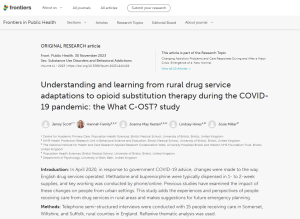Personal circumstances and transport impacted opioid substitution therapy in rural areas during pandemic
14 December 2023
People taking part in opioid substitution therapy (OST) could benefit from being involved in developing their own response plans to future emergency situations, such as the pandemic. A paper published in Frontiers in Public Health looked at OST provision in rural settings and found that pre-existing personal circumstances and limited transport impacted how well people dealt with service changes.
Someone on OST is usually prescribed a daily dose of methadone or buprenorphine which they take under the supervision of a pharmacist, especially during the early phase of treatment. During the pandemic, people on OST were given a 1- or 2-week supply of methadone and buprenorphine to take home with them. Contact with key workers and psychosocial support groups took place over the phone or online instead of face-to-face.
Researchers from the Universities of Bath and Bristol, supported by NIHR ARC West and NIHR Health Protection Research Unit in Behavioural Science and Evaluation, interviewed 15 people receiving care in three rural counties in England to understand what impact changing the way OST was delivered had on service users. They found that supportive relationships and finding a meaningful way of spending time were key to being able to make positive use of the new way in which services were delivered.
In contrast, those who had less stability, including mental health struggles and social isolation, felt cut off and unheard, particularly from key workers. Reduced rural transport was also a significant community-level issue. It got in the way of OST collection and social support.
Dr Jenny Scott, Senior Lecturer at Bristol Medical School and lead author, said :
“Relaxation of service engagement requirements was experienced in one of two ways, which intersected with the extent to which the person had wider support or felt isolated.
“People who may have been struggling before the pandemic found coping with change more challenging. Lockdowns amplified their struggles and made them feel like the support they needed was gone or hard to reach.
“On the other hand, those who felt more on track or who didn’t need quite so much in-person support found the changes to OST provision helpful. They felt the changes fit with their lifestyle better and enjoyed having more freedom to engage with other things.
“We also found that those people who experienced anxiety were better able to engage with online support compared to in-person groups. They found it easier to engage with and benefited more from remote service provision. Our work emphasises a ‘one size fits all’ approach is not appropriate”
Paper
